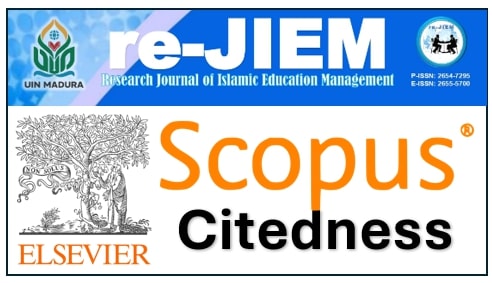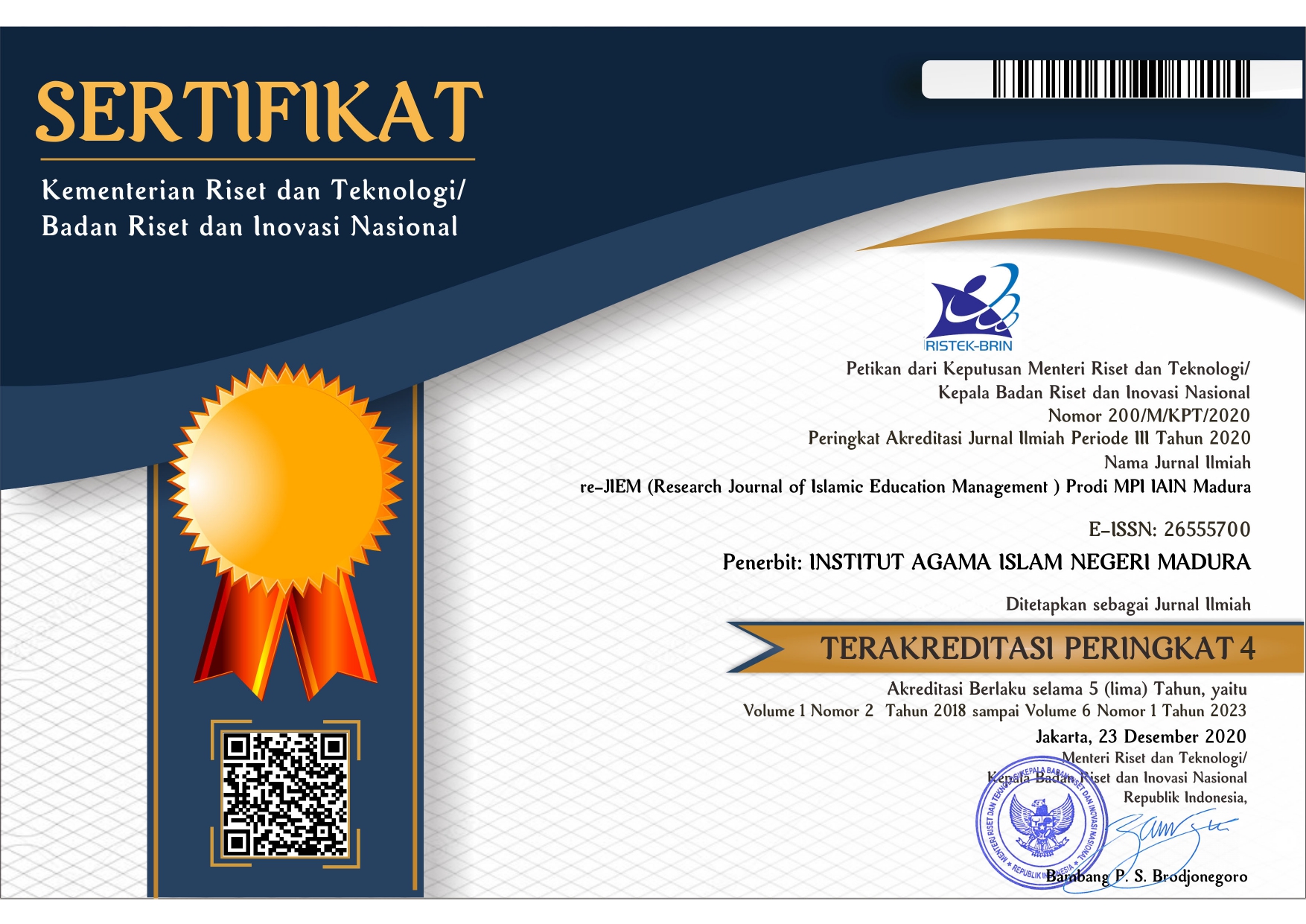ANALISIS DIFERENSIASI: PERSEPSI KEADILAN ORGANISASI PADA DOSEN INSTITUT AGAMA ISLAM NEGERI TAKENGON
 Abstract views: 392
,
Abstract views: 392
,
 PDF downloads: 368
PDF downloads: 368
Abstract
Perceptions of organizational justice are often justified in different ways by each lecturer from all higher education institutions, especially at the Takengon State Islamic Institute. This study will examine the level of differentiation in the perception of organizational justice based on the demographic characteristics of the lecturers of the Takengon State Islamic Institute. The population in this study amounted to 141 with a sample of 59 lecturers whose sampling technique used simple random sampling. The research approach used is quantitative with non-parametric statistical analysis methods. Based on the results of the study, it can be found a level of differentiation of organizational justice based on the predictor of gender with a significance value of 0.034. Meanwhile, the predictors of demographic characteristics of age, tenure, position status, education level, and employment status did not have a significant level of differentiation with values of 0.408, 0.432, 0.468, 0.331, and 0.791. It can be concluded that the predictor of gender has a significant level of differentiation from the perception of organizational justice of the lecturers of the Takengon State Islamic Institute.
Downloads
References
Ahmad, Masduki. “BUDAYA ORGANISASI DAN KEADILAN ORGANISASI DALAM LOYALITAS DOSEN DI UNIVERSITAS ISLAM AS-SYAFI’IYAH.” Jurnal Administrasi Pendidikan 26, no. 1 (30 April 2019): 98–107. https://doi.org/10.17509/jap.v26i1.20102.
Akyel, Yakup. “Analysis of Relationships between Coaches’ Organizational Justice and Leader-Member Exchange by Structural Equation Modeling.” International Journal of Higher Education 7, no. 3 (15 Juni 2018): 197. https://doi.org/10.5430/ijhe.v7n3p197.
Altinkurt, Yahya, Kursad Yilmaz, dan Gizem Karaman. “The Effect of Gender, Seniority and Subject Matter on the Perceptions of Organizational Justice of Teachers: A Meta-Analytical Study.” Educational Sciences: Theory & Practice, 2015. https://doi.org/10.12738/estp.2015.1.2264.
Bach, Stephen. “Personnel Management in Transition.” Dalam Managing Human Resources. Blackwell Publihsing, 2005.
Butitova, Darima. “Perceptions of Organizational Justice Among State Government Employees: The Effect of Years of Public Service.” Public Personnel Management 48, no. 3 (September 2019): 345–68. https://doi.org/10.1177/0091026018816348.
Champoux, Joseph E. Organizational Behavior : Integrating Individuals, Groups, And Organizations. New York: Routledge, 2017.
Choi, Sungjoo. “Organizational Justice and Employee Work Attitudes: The Federal Case.” The American Review of Public Administration 41, no. 2 (Maret 2011): 185–204. https://doi.org/10.1177/0275074010373275.
Dailey, Robert. Organisational Behaviour. Harlow, England: Pearson Education Hall, 2012.
Erkılıç, Eren, Cengiz Gazeloğlu, dan Engin Aytekin. “Organizatonal Justice Perceptions Of Hospitaly Business Employees In The Scope Of Demographic Characteristics: A Sudy In Rize.” Dalam Issues in Tourism, Human Rights & Sustainable Environment. London: IJOPEC Publication, 2018.
Fischer, Ronald, dan Peter B. Smith. “Values and Organizational Justice: Performance- and Seniority-Based Allocation Criteria in the United Kingdom and Germany.” Journal of Cross-Cultural Psychology 35, no. 6 (November 2004): 669–88. https://doi.org/10.1177/0022022104270110.
Griffin, Ricky W., dan Gregory Moorhead. Organizational Behavior: Managing People and Organizations. 11th Edition. Australia: South-Western/Cengage Learning, 2014.
Hitt, Michael A., C. Chet Miller, dan Adrienne Colella. Organizational Behavior. Third. New Jersey: John Wiley & Sons, Inc., 2014.
Hossein, Dargahi, dan Koiek Somayeh. “Organizational Citizenship Behaviors and Counterproductive Work Behaviors: A Study of Tehran University of Medical Sciences Staff.” Review of Public Administration and Management 6, no. 2 (2018): 1. https://doi.org/10.4172/2315-7844.1000247.
Kim, T. K., P. Solomon, dan C. Jang. “Organizational Justice and Social Workers’ Intentions to Leave Agency Positions.” Social Work Research 36, no. 1 (1 Maret 2012): 31–39. https://doi.org/10.1093/swr/svs001.
Kinicki, Angelo, dan Mel Fugate. Organizational Behavior: A Practical, Problem-Solving Approach. Second edition. New York, NY: McGraw-Hill Education, 2018.
Koç, Mehmet, Cengiz Akçay, dan Bertan Akyol. “Organizational Justice Perceptions and Views on Violence of Branch Teachers Working in Primary Schools.” Journal of Education and Training Studies 4, no. 10 (19 Agustus 2016): 105–17. https://doi.org/10.11114/jets.v4i10.1756.
Konopaske, Robert, John M. Ivancevich, dan Michael T. Matteson. Organizational Behavior and Management. Eleventh Edition. Dubuque, IA: McGraw-Hill Education, 2016.
Luthans, Fred. Organizational Behavior: An Evidence-Based Approach. 12th ed. New York: McGraw-Hill Irwin, 2011.
Martins, Jo. M., Farhat Yusuf, dan David A. Swanson. Consumer Demographics And Behaviour. New York: Springer, 2012.
Mathis, Robert L, dan John H Jackson. Human Resource Management. Mason, OH: Cengage Learning, 2011.
McShane, Steven Lattimore, dan Mary Ann Young Von Glinow. Organizational Behavior: Emerging Knowledge, Global Reality. Eighth edition. New York, NY: McGraw-Hill Education, 2018.
Monged, Tamer M., Mohamed A. Raghab, dan Passant Tantawi. “The Effect of Demographic Factors on Organizational Justice and Intention to Leave in the Private Higher Education Sector in Egypt.” OALib 06, no. 07 (2019): 1–19. https://doi.org/10.4236/oalib.1105539.
Musringudin, Makruf Akbar, dan Netti Karnati. “The Effect Of Organizational Justice, Job Satisfaction, And Organizational Commitement On Organizational Citizenship Behavior (OCB) Of The Principles” 4, no. 2 (2017).
Nasurdin, Aizzat Mohd., dan Soon Lay Khuan. “Organizational Justice as an Antecedent of Job Performance.” Gadjah Mada International Journal of Business 9, no. 3 (18 Juni 2013): 335. https://doi.org/10.22146/gamaijb.5593.
Pol, Louis G., dan Richard K. Thomas. The Demography Of Health And Healthcare. New York, NY, 2013.
Pynes, Joan E. Human Resources Management For Public And Nonprofi t Organizations : A Strategic Approach. San Francisco: John Wiley & Sons, Inc., 2009.
Ricky W. Griffin dan Anne M. O’Leary-Kelly. The Dark Side Of Organizational Behavior. San Frasisco: John Wiley & Sons, Inc, 2004.
Rıza Terzi, Ali, Ayşe Pınar Dülker, Fatih Altın, Filiz Çelik, Merve Dalkıran, Nazmiye Tuba Yulcu, Selim Tekin, dan Ünal Deniz. “An Analysis of Organizational Justice and Organizational Identification Relation Based on Teachers’ Perceptions.” Universal Journal of Educational Research 5, no. 3 (Maret 2017): 488–95. https://doi.org/10.13189/ujer.2017.050320.
Robbins, Stephen P., dan Tim Judge. Organizational Behavior. 15th ed. Boston: Pearson, 2013.
Sadeghi, Mohammad Reza, Seyyed Mohammad Mahdi Musavi, Saied Samiie, dan Amirhesam Behrooz. “Developing Human Resource Productivity through Organizational Justice.” Journal of Public Administration and Governance 3, no. 2 (10 Juli 2013): 173. https://doi.org/10.5296/jpag.v3i2.3575.
Schermerhorn, John R. Management. New Jersey: John Wiley & Sons, Inc., 2013.
Schneider, Benjamin, dan Karen M. Barbera, ed. The Oxford Handbook of Organizational Climate and Culture. New York: Oxford University Press, 2014.
Simpson, Patricia A., dan Michelle Kaminski. “Gender, Organizational Justice Perceptions, and Union Organizing.” Employee Responsibilities and Rights Journal 19, no. 1 (27 Februari 2007): 57–72. https://doi.org/10.1007/s10672-006-9032-9.
Snell, Scott, dan George Bohlander. Managing Human Resources. Mason: Cengage Learning, 2013.
Wan, Hooi Lai. Organisational Justice and Citizenship Behaviour in Malaysia. Governance and Citizenship in Asia. Singapore: Springer Singapore, 2016. https://doi.org/10.1007/978-981-10-0030-0.
Yang, Jason Cheng-Cheng, dan I-Pei Cho. “Organizational Justice In Higher Education: Perceptions Of Taiwanese Professors And Staffs.” Contemporary Issues in Education Research (CIER) 10, no. 4 (29 September 2017): 231–40. https://doi.org/10.19030/cier.v10i4.10037.
Yean, Tan Fee, dan Ab Aziz Yusof. “Organizational Justice: A Conceptual Discussion.” Procedia - Social and Behavioral Sciences 219 (Mei 2016): 798–803. https://doi.org/10.1016/j.sbspro.2016.05.082.
Copyright (c) 2022 Farid Fauzi

This work is licensed under a Creative Commons Attribution-ShareAlike 4.0 International License.
Authors who publish with this journal agree to the following terms:
Authors retain copyright and grant the journal the right of first publication with the work simultaneously licensed under a Creative Commons Attribution-ShareAlike 4.0 International License that allows others to copy and redistribute the material in any medium or format with an acknowledgment of the work's authorship and initial publication in this journal and also allows them to remix, transform, and build upon the material for any purpose, even commercially, with contributions under the same license as the original.
Authors are able to enter into separate, additional contractual arrangements for the non-exclusive distribution of the journal's published version of the work (e.g., post it to an institutional repository or publish it in a book), with an acknowledgment of its initial publication in this journal.
Authors are permitted and encouraged to post their work online (e.g., in institutional repositories or on their website) prior to and during the submission process, as it can lead to productive exchanges, as well as earlier and greater citation of published work.


























